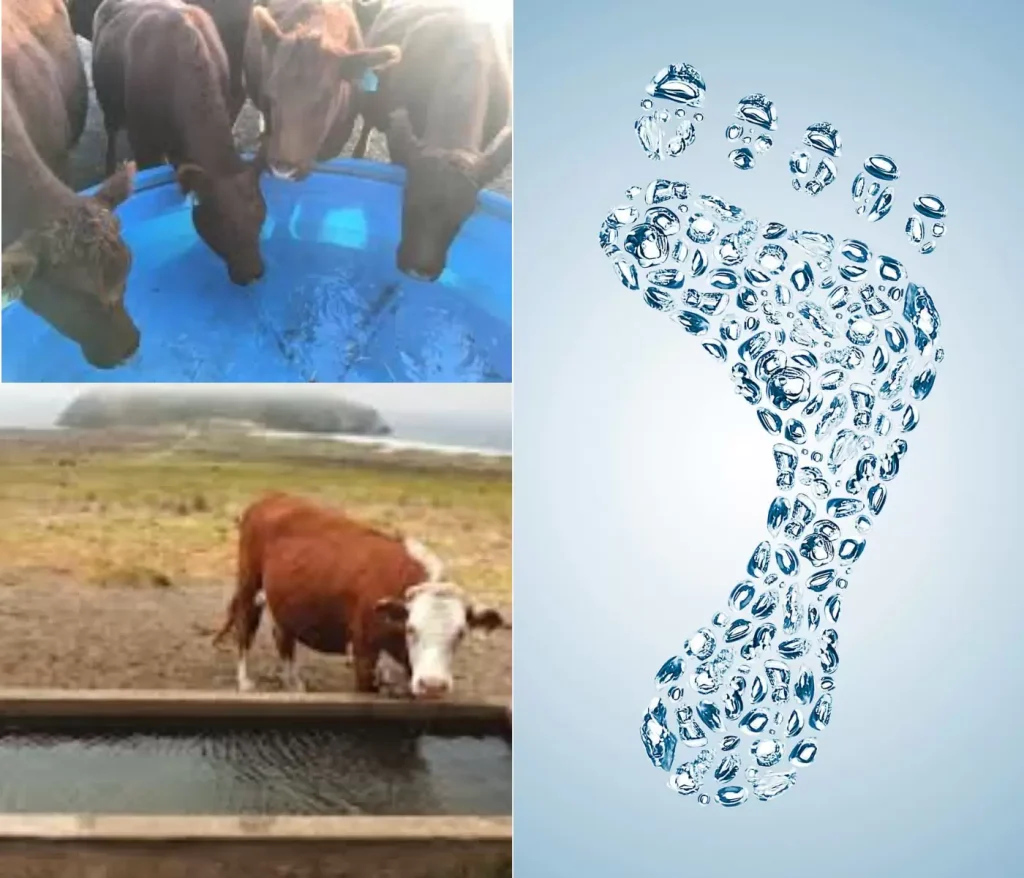Азбаски истеъмолкунандагон дар бораи таъсири интихоби онҳо ба сайёра бештар дарк мекунанд, фаҳмидани оқибатҳои экологии истеҳсол ва истеъмоли гӯшт муҳим аст. Дар ин мақола мо мефаҳмем, ки чӣ гуна саноати гӯшт ба тағирёбии иқлим, норасоии об, буридани ҷангалҳо ва аз даст додани гуногунии биологӣ мусоидат мекунад. Мо инчунин алтернативаҳои устувори гӯшт ва аҳамияти қабули парҳезҳои растаниро . Ба мо ҳамроҳ шавед, вақте ки мо хароҷоти пинҳонии экологиро паси истеҳсоли маҳсулоти гӯштии дӯстдоштаамон меомӯзем.
Таъсири мухити зисти истехсоли гушт Истеҳсоли гӯшт ба партовҳои газҳои гулхонаӣ саҳми назаррас мегузорад ва онро омили асосии тағирёбии иқлим месозад. Истифодаи аз ҳад зиёди замин, об ва энергия дар истеҳсоли гӯшт боиси таназзули муҳити зист ва камшавии захираҳо мегардад.
Истеъмоли гӯшт ва тағирёбии иқлим
Талаботи афзоянда ба гӯшт дар саросари ҷаҳон ба ихроҷи метан, як гази пурқуввати гулхонаӣ, ки тағирёбии иқлимро суръат мебахшад, мусоидат мекунад. Кам кардани истеъмоли гӯшт метавонад ба коҳиш додани тағирёбии иқлим тавассути коҳиш додани эҳтиёҷ ба парвариши чорвои пуршиддат ва таъсироти марбут ба муҳити зист мусоидат кунад.
Обмонии саноати гушт Истеҳсоли гӯшт миқдори зиёди обро талаб мекунад, ки ба камобӣ ва ифлосшавии об мусоидат мекунад. Қабули таҷрибаҳои идоракунии устувори об ва пешбурди парҳези растанӣ метавонад осори обро дар соҳаи гӯшт коҳиш диҳад.
Буридани чангал ва истехсоли гушт Тавсеаи саноати гӯшт як омили асосии буридани ҷангалҳо мебошад, алахусус дар минтақаҳо, ба монанди ҷангали тропикии Амазонка. Чорводорӣ барои чаронидани чорво ва парвариши хўроки чорво миқдори зиёди заминро талаб мекунад, ки боиси нобудшавии ҷангалҳо ва аз даст додани гуногунии биологӣ мегардад.
Таъсири саноати гӯшт ба гуногунии биологӣ Саноати гӯшт ба аз байн рафтани гуногунии биологӣ тавассути нобудшавии муҳити зист, ифлосшавӣ ва аз ҳад зиёд истифода бурдани захираҳои табиӣ мусоидат мекунад. Пешбурди кишоварзии устувор ва гузаштан ба парҳези растанӣ метавонад ба ҳифзи гуногунии биологӣ ва барқарор кардани экосистемаҳо мусоидат кунад.
Устувор ва алтернативаҳои гӯшт Парҳезҳои растанӣ ва сарчашмаҳои алтернативии сафеда ба истеҳсоли гӯшти анъанавӣ алтернативаҳои устувортар пешниҳод мекунанд. Сармоягузорӣ ба тадқиқот ва таҳияи маҳсулоти ивазкунандаи гӯшт метавонад ба эҷоди системаи ғизои аз ҷиҳати экологӣ тоза мусоидат кунад.
Истеъмоли гӯшт ва тағирёбии иқлим Талаботи афзоянда ба гӯшт дар саросари ҷаҳон ба ихроҷи метан, як гази пурқуввати гулхонаӣ, ки тағирёбии иқлимро суръат мебахшад, мусоидат мекунад. Метан дар ҷараёни ҳозимаи ҳайвонот, бахусус ҳайвоноти кавзашаванда, ба монанди чорпоён ва гӯсфанд тавлид мешавад.
Чорводории интенсивӣ барои қонеъ кардани талаботи афзоянда ба гӯшт амалӣ карда мешавад, ки боиси зиёд шудани партовҳои метан мегардад. Сабаб дар он аст, ки шумораи зиёди ҳайвонот дар ҷойҳои хурд ҷойгир карда мешаванд, ки ин минтақаҳои мутамаркази истеҳсоли метанро ба вуҷуд меорад.
Гайр аз ин, истехсол ва кашондани хуроки чорво, инчунин коркард ва яхдон кардани махсулоти гушт микдори зиёди энергияро талаб мекунад. Ин энергия асосан аз сӯзишвории истихроҷшуда бармеояд, ки минбаъд ба партовҳои газҳои гулхонаӣ мусоидат мекунад.
Кам кардани истеъмоли гӯшт метавонад ба коҳиш додани тағирёбии иқлим тавассути коҳиш додани эҳтиёҷ ба парвариши чорвои пуршиддат ва таъсироти марбут ба муҳити зист мусоидат кунад. Бо интихоби алтернативаҳои ба растанӣ асосёфта ё иштирок дар рӯзҳои бе гӯшт, одамон метавонанд изофаи карбонро коҳиш диҳанд ва ба ояндаи устувортар саҳм гузоранд.
Обмонии саноати гушт Истеҳсоли гӯшт миқдори зиёди обро талаб мекунад, ки ба камобӣ ва ифлосшавии об мусоидат мекунад. Пойгоҳи обии саноати гӯшт на танҳо истифодаи мустақими обро барои нӯшидан, тозакунӣ ва коркарди ҳайвонот, балки истифодаи ғайримустақими обро дар парвариши зироатҳои хўроки чорво низ дар бар мегирад.
Миқдори оби гӯшт дар муқоиса бо ғизои растанӣ хеле зиёд аст. Масалан, барои истеҳсоли 1 кило гӯшти гов ҳудуди 15 000 литр об лозим аст, дар ҳоле ки барои истеҳсоли 1 кило гандум ҳамагӣ 1250 литр об лозим аст.
Ин истифодаи аз ҳад зиёди об ба захираҳои об, бахусус дар минтақаҳое, ки камбуди об алакай мушкил аст, фишор меорад. Ғайр аз он, маҷрои чорво аз кишоварзӣ, аз ҷумла пору ва кимиёвии кишоварзӣ, дарёҳо, кӯлҳо ва системаҳои обҳои зеризаминиро олуда карда, ба сифати оби дастрас таъсир мерасонад.
Барои кам кардани об дар саноати гӯшт, қабули таҷрибаҳои устувори идоракунии об муҳим аст. Ин татбиқи технологияҳо ва таҷрибаҳои каммасрафи об, аз қабили обёрии қатрагӣ ва кишоварзии дақиқро дар бар мегирад. Илова бар ин, пешбурди парҳезҳои растанӣ метавонад изофаи обро, ки бо истеҳсоли гӯшт алоқаманд аст, ба таври назаррас коҳиш диҳад.
Буридани чангал ва истехсоли гушт
Тавсеаи саноати гӯшт як омили асосии буридани ҷангалҳо мебошад, алахусус дар минтақаҳо, ба монанди ҷангали тропикии Амазонка.
Чорводорӣ барои чаронидани чорво ва парвариши хўроки чорво миқдори зиёди заминро талаб мекунад, ки боиси нобудшавии ҷангалҳо ва аз даст додани гуногунии биологӣ мегардад.
Таъсири саноати гӯшт ба гуногунии биологӣ Саноати гӯшт ба аз байн рафтани гуногунии биологӣ тавассути нобудшавии муҳити зист, ифлосшавӣ ва аз ҳад зиёд истифода бурдани захираҳои табиӣ мусоидат мекунад. Чорводорӣ барои чаронидани чорво ва парвариши хўроки чорво миқдори зиёди заминро талаб мекунад, ки боиси нобудшавии ҷангалҳо ва аз даст додани гуногунии биологӣ мегардад. Тоза кардани замин барои парвариши чорво макони зисти намудҳои зиёди ҳайвонот ва набототро коҳиш медиҳад, ки дар натиҷа гуногунии биологӣ коҳиш меёбад. Илова бар ин, маҷрои партовҳои ҳайвонот ва истифодаи пеститсидҳо ва антибиотикҳо дар истеҳсоли гӯшт метавонад роҳҳои обро олуда карда, ба экосистемаҳои обӣ зарари бештар расонад. Истифодаи аз ҳад зиёди захираҳо, ба монанди моҳигирии аз ҳад зиёд барои хӯрок ва шикори ҳайвоноти ваҳшӣ барои гӯшт, ба гуногунии биологӣ фишори иловагӣ мегузорад.
Пешбурди кишоварзии устувор ва гузаштан ба парҳези растанӣ метавонад ба ҳифзи гуногунии биологӣ ва барқарорсозии экосистемаҳо мусоидат кунад. Таҷрибаҳои устувори кишоварзӣ, ки ба ҳифзи замин ва кишоварзии барқароршаванда афзалият медиҳанд, метавонанд барқарорсозии экосистемаҳо ва ҳифзи муҳити зисти ҳайвоноти ваҳширо дастгирӣ кунанд. Бо кам кардани истеъмоли гӯшт ва интихоби парҳези растанӣ, шахсони алоҳида метавонанд дар коҳиш додани талабот ба чорводории интенсивӣ ва таъсири манфии он ба гуногунии биологӣ нақш бозанд.
Устувор ва алтернативаҳои гӯшт Яке аз роҳҳои самараноки коҳиш додани таъсири экологии истеҳсоли гӯшт ин қабули алтернативаҳои устувор ва растанӣ мебошад. Парҳезҳои растанӣ, ки ба истеъмоли меваҳо, сабзавот, ғалладонаҳо ва лӯбиёҳо тамаркуз мекунанд, собит шудааст, ки дар муқоиса бо парҳезҳои вазнини гӯшт таъсири экологӣ ба таври назаррас камтар доранд.
Тавассути кам кардани вобастагии худ ба маҳсулоти ҳайвонот, мо метавонем фишорро ба захираҳои замин, об ва энергия коҳиш диҳем. Парҳезҳои растанӣ барои истеҳсол захираҳои камтарро талаб мекунанд, ки боиси коҳиши партовҳои газҳои гулхонаӣ, истифодаи об ва буридани ҷангал мегардад.
Ғайр аз он, таҳия ва қабули манбаъҳои алтернативии сафеда барои имконоти устувор ва аз ҷиҳати экологӣ тоза потенсиали боз ҳам бештар фароҳам меорад. Ин алтернативаҳо, ба монанди ивазкунандаи гӯшти растанӣ ё гӯшти парваришшуда, ба истеъмолкунандагон маҳсулоте пешниҳод мекунанд, ки ба таъм ва сохтори гӯшти анъанавӣ тақлид мекунанд ва дар ҳоле ки таъсири хеле камтари муҳити зист доранд.
Сармоягузорӣ дар таҳқиқот ва таҳияи ин алтернативаҳо барои эҷоди системаи устувори ғизо муҳим аст. Бо дастгирӣ ва пешбурди ин алтернативаҳо, мо метавонем ба кам кардани таъсири муҳити зисти истеҳсоли гӯшт бидуни осебпазирии таъм ва ғизо мусоидат кунем.
Хулоса Арзиши аслии гӯшт аз нуқтаи назари экологӣ назаррас аст. Истеҳсоли гӯшт ба партовҳои газҳои гулхонаӣ, нобудшавии ҷангалҳо, талафоти гуногунии биологӣ, норасоии об ва ифлосшавӣ мусоидат мекунад. Бо вуҷуди ин, барои коҳиш додани ин таъсирҳо роҳҳои ҳалли мушкилот мавҷуданд. Кам кардани истеъмоли гӯшт, қабули таҷрибаҳои устувори идоракунии об ва пешбурди парҳези растанӣ роҳҳои муассири кам кардани таъсири экологии саноати гӯшт мебошанд. Илова бар ин, сармоягузорӣ ба тадқиқот ва таҳияи манбаъҳои алтернативии сафеда метавонад барои системаи устувори ғизо роҳ кушояд. Бо интихоби бошуурона ва қабули алтернативаҳои устувор, мо ҳама метавонем дар кам кардани таъсири экологии истеҳсоли гӯшт ва эҷоди сайёраи солимтар барои наслҳои оянда нақш гузорем.



















































